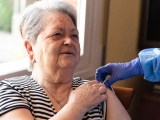Jul 8, 2011
Improperly stored soup leads to 2 botulism cases
As a reminder of the dangers of botulism, the US Centers for Disease Control and Prevention (CDC) detailed in today's Morbidity and Mortality Weekly Report (MMWR) two cases of botulism poisoning this year resulting from eating improperly stored potato soup. On Jan 28 a 29-year-old Ohio man was hospitalized after 5 days of progressive dizziness, blurred vision, and difficulty swallowing and breathing. He had bought refrigerated soup but had stored it unrefrigerated for 42 days before tasting some from the then-bulging container on Jan 18, noting a bad taste, and discarding the remainder. He required 57 days' hospitalization before being transferred with residual weakness to a rehabilitation facility. On Apr 8 a 41-year-old Georgia woman was hospitalized after 4 days of progressive dizziness and difficulty swallowing. In the hospital she developed respiratory distress, required mechanical ventilation, and was treated with botulism antitoxin. Five days before hospitalization she too had tasted soup that she bought refrigerated but left unrefrigerated for 18 days. The report concludes, "If a low-acid food such as potato soup is stored unrefrigerated in an anaerobic environment (eg, a sealed container), without a barrier to bacterial growth, spores can germinate, resulting in bacterial growth and botulinum toxin production. Because heating food to a temperature of 185°F (85°C) for 5 minutes inactivates the toxin, proper preparation also is an important safeguard."
Jul 8 MMWR report
FDA approves Tdap vaccine for those over 65
The US Food and Drug Administration (FDA) today approved GlaxoSmithKline's tetanus, diphtheria, and pertussis (Tdap) vaccine, Boostrix, in people 65 and older, the agency said in a press release. "Currently," the FDA said, "there are vaccines approved for the prevention of tetanus and diphtheria that can be used in adults 65 and older. Boostrix, which is given as a single-dose booster shot, is the first vaccine approved to prevent all three diseases in older people." Boostrix was approved for adults 19 to 64 in 2008. The safety and effectiveness of Boostrix was based on a study of about 1,300 people ages 65 and older. Boostrix was originally approved in 2005 for use in children and adolescents 10 to 18 years old.
Jul 8 FDA press release
Mumps outbreak spreads from Whistler ski area
Health officials from the Vancouver Coastal Health Authority (VCHA) reported yesterday that they are investigating a mumps outbreak that started in the Whistler ski resort area and has since spread to other cities, including Vancouver. In a report posted on ProMed-mail, the Internet-based reporting system of the International Society for Infectious Diseases, they said 90 mumps cases, mainly in young adults, have been reported since February. Transmission among the initial cases appeared to spread through the sharing of marijuana joints, cigarettes, drinks, and utensils. Many of the cases in Whistler are employees of the ski report or surrounding establishments. Though several of the more recent cases don't have links to Whistler, some are clustered along the same household or social network. The authors said Whistler has a seasonal workforce and includes people from many different countries. They added that most of the infected patients had not received two doses of the measles, mumps, and rubella (MMR) vaccine. Young people born between 1970 and 1995 in the area may be vulnerable to the disease, because a second dose at age 18 months was not recommended until 1996. The health department has launched an extensive vaccine campaign that also targeted a large ski and music event in Whistler. Communication and immunization activities will also target area colleges in the fall.
Jul 7 ProMed post
Humane Society, egg industry reach animal welfare agreement
The Humane Society of the United States and United Egg Producers today unveiled an agreement to push for federal mandates on animal welfare standards for egg farms, Food Safety News reported. The two groups have frequently clashed over animal welfare issues. The proposed new standards, which would be the first addressing the treatment of animals on farms, would phase out battery cages in favor of housing systems that include nesting boxes and scratching areas. Eggs that don't meet the new standards wouldn't be cleared for sale in the United States. The egg industry has pledged $4 million toward overhauling industry practices over the next 15 years, according to the Food Safety News report. The pork industry criticized the agreement, because it reduces producers' ability to decide what's best for the animals and respond to market demands. Scientific studies comparing the safety of conventionally produced eggs versus those produced with cage-free methods have been limited and have yielded contradictory findings.
Jul 8 Food Safety News story


















